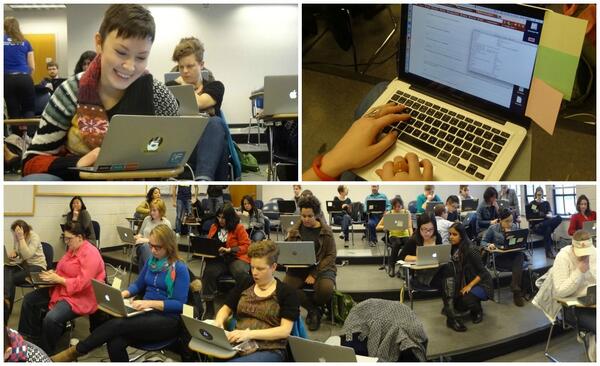Community Data Science Workshops (Spring 2015): Difference between revisions
No edit summary |
No edit summary |
||
| Line 1: | Line 1: | ||
<div style="float:right;"> | <div style="float:right;"> | ||
Revision as of 22:08, 15 March 2015

| Register for the workshop
Registration closes on April 3rd. Have experience to share? Sign up to be a mentor |
The Community Data Science Workshops in Spring 2015 are a series of project-based workshops being held at the University of Washington for anyone interested in learning how to use programming and data science tools to ask and answer questions about online communities like Wikipedia, Twitter, free and open source software, and civic media.
The workshops are for people with absolutely no previous programming experience and they bring together researchers and academics with participants and leaders in online communities. The workshops are run entirely by volunteers and are entirely free of charge for participants, generously sponsored by the UW Department of Communication and the eScience Institute. Participants from outside UW are encouraged to apply.
There will be a mandatory evening setup session 6:00-9:00pm on Friday April 10 and three workshops held from 9am-4pm on three Saturdays (April 11 and 25 and May 9). Each Saturday session will involve a period for lecture and technical demonstrations in the morning. This will be followed by a lunch graciously provided by the eScience Institute at UW. The rest of the day will be followed by group work on programming and data science projects supported by more experienced mentors.
Setup and Programming Tutorial (April 10 evening) — Because we expect to hit the ground running on our first full day, we will meet to help participants get software installed and to work through a self-guided tutorial that will help ensure that everyone has the skills and vocabulary to start programming and learning when we meet the following morning.
Introduction to Programming (and April 11) — Programming is an essential tool for data science and is useful for solving many other problems. The goal of this session will be to introduce programming in the Python programming language. Each participant will leave having solved a real problem and will have built their first real programming project.
Importing Data from web APIs (April 25) — An important step in doing data science is collecting data. The goal of this session will be to teach participants how to get data from the public application programming interfaces ("APIs") common to many social media and online communities. Although we will use the APIs provided by Wikipedia and Twitter in the session, the principles and techniques are common to many other online communities.
Data Analysis and Visualization (May 9) — The goal of data science is to use data to answer questions. In our final session, we will use the Python skills we learned in the first session and the datasets we've created in the second to ask and answer common questions about the activity and health of online communities. We will focus on learning how to generate visualizations, create summary statistics, and test hypotheses.
Our goal is that, after the three workshops, participants will be able to use data to produce numbers, hypothesis tests, tables, and graphical visualizations to answer questions like:
- Are new contributors in Wikipedia this year sticking around longer or contributing more than people who joined last year?
- Who are the most active or influential users of a particular Twitter hashtag?
- Are people who join through a Wikipedia outreach event staying involved? How do they compare to people who decide to join the project outside of the event?
An earlier version of the workshops was run in Spring and Fall 2015 and the curriculum we used for both are online.
Sign up and Participate!
Participants! If you are interested in learning data science, please fill out our registration form here. The deadline to register is Friday April 3. We will let participants know if we have room for them by Monday April 6. Space is limited and will depend on how many mentors we can recruit for the sessions.
Interested in being a mentor? If you already have experience with Python, please consider helping out at the sessions as a mentor. Being a mentor will involve working with participants and talking them through the challenges they encounter in programming. No special preparation is required. And we'll feed you! Because we want to keep a very high mentor-to-student ratio, recruiting more mentors means we can accept more participants. If you're interested you can fill out this form or email makohill@uw.edu. Also, thank you, thank you, thank you!
About the Organizers
The workshops are being coordinated, organized by Benjamin Mako Hill, Dharma Dailey, Jonathan Morgan, Ben Lewis, and Tommy Guy and a long list of other volunteer mentors. The workshops have been designed with lots of help and inspiration from Shauna Gordon-McKeon and Asheesh Laroia of OpenHatch and lots of inspiration from the Boston Python Workshop.
These workshops are an all-volunteer effort. Fundamentally, we're doing this because we're programmers and data scientists who work in online communities and we really believe that the skills you'll learn in these sessions are important and empowering tools.
The workshops are being supported by the UW Department of Communication and the eScience Institute.
If you have any questions or concerns, please contact Benjamin Mako Hill at makohill@uw.edu.


